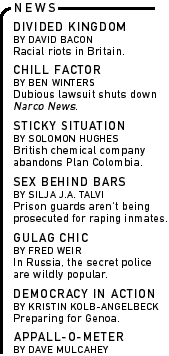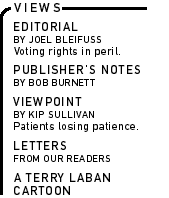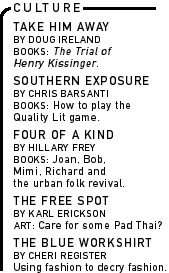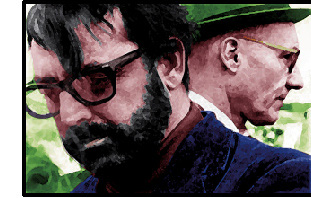|
|

|

|

|
|
|
| |
|
|
|
Now Dig This: The Unspeakable Writings Some writers are just made for posterity. The great novelists who inspire, delight and enrage over the years in a series of (generally lengthy) novels that plumb the depths of the American soul, the Roths, Updikes, Bellows--the literary establishment knows what to do with them. Lifetime coverage, for good or bad, by all the major journals, of course, and, upon their passing, the procession of biographical tomes, reissues and the occasional discovery of a lost book or fragment. But what do you do with a guy like Terry Southern? Yippie raconteur, literary
Terry Southern was born in Texas in 1924, and it's tempting to say that he never left. Regardless of where he went afterward, he liked to carry with him a certain belt-buckle-grabbing and whiskey-snorting Texan bravado. After a brief stint in the Army toward the end of World War II, he enrolled in a couple of colleges before finally hoofing it to Paris to commune with the American literary expatriate crowd. Although by no means a writer who simply played up his friendship with other more famous writers, some of Southern's best work comes in his recollections of these times and people. From a short and rather oblique tribute to Kurt Vonnegut published in the Evergreen Review, Southern describes meeting Vonnegut with George Plimpton so:
Like other American writers in Paris (whom he referred to as "some interesting Quality-Lit types") soon to scandalize their native land with novels considered too salacious and debauched for the general public, Southern achieved his first real success with Maurice Girodias' Olympia Press. Girodias (or "Gid" as Southern called him) published Candy in 1958. Co-written with poet buddy Mason Hoffenberg, the novel concerned the erotic adventures of the titular "fabulous, blue-eyed, pink-nippled, pert-derriered darling" in the West Village who falls in love with a humpback. It was was originally conceived as a short story during what Southern termed his "Cocteau/opium" period. So pornographic that even the French government banned it initially, Candy was later published with a much tamer cover in the United States as Lollipop and became an underground hit. Now Dig This is not very concerned, however, with Southern's fiction escapades like Candy and his other novels, Blue Movie, Flash and Filigree, The Magic Christian and Texas Summer (though it does contain many references to Candy and an amusing outline for Blue Movie). The collection, edited by musician Alan Jay Friedman and Southern's son Nile, was started by Terry and Nile two decades ago. The final product is a study not just of Southern's non-novelistic writing, but of how he lived as a writer. Like Hunter S. Thompson without the preening ego, Southern's magazine sketches and epistolary ramblings are notable often less for what they're saying than how it's being said, and in what state of mind. Southern was almost a better talker than a writer, which is possibly why the editors have bookended the volume with interviews. His fiction never seems without a comedic sparkle, yet there's always a formality to the product that rarely pops up in his free-flowing bebop nonfiction. The section of Now Dig This called "Behind the Silver Screen" might as well have been retitled, simply, "Kubrick." Even though Southern worked on many other screenplays, including The Loved One (with Christopher Isherwood) and The Cincinnati Kid (with Ring Lardner Jr.), it was his collaboration with Stanley Kubrick on Dr. Strangelove that has come closest to earning him a guaranteed place in the literary firmament. Unlike much of the writing on Kubrick--which has a tendency to treat him less as a man than a dark, abstract conglomeration of godlike cinematic impulses--Southern treats him as just another guy in his circle of friends: "Big Stan Kubrick." Southern recalls the man as someone who "who scarcely let as much as a trouser pleat go unsupervised." This article, "Strangelove Outtake: Notes from the War Room," is quite possibly the gem in the whole book, not just for its wry look at the filming of the movie (the scene in which Southern meets up with Slim Pickens in England, fresh off the Western rodeo circuit, is simply a hoot), but for its loving and truly cinematic description of the infamous pie-fight scene that explodes in the Pentagon War Room just at the film's climax--and which was ultimately cut. Elsewhere, in "Fiasco Reverie" Southern details the experiences of his friend Boris Grgurevich as a baffled participant in the Bay of Pigs invasion of Cuba. Starting off with the CIA's lavish overexpenditure on just about everything, the story follows Boris through his time in a Guatemalan "training camp" so riddled with corruption and laziness and lacking in even the merest modicum of military discipline that it rivals anything Joseph Heller could ever have dreamed up. The story kicks into high comedy, once "the invasion" begins:
Through a curious diversionary tactic of our own we had put all the supplies on that one [sinking] ship. (That strategy, I later learned, was based on a chess theory called "King Forward," well thought of at CIA headquarters, but apparently not yet fully developed.) It was disheartening to watch her go down; but the L.S.T.s plowed ahead--G-2 had promised quick capitulation of the adversary at the first show of strength. To keep things in high gear, the book immediately follows with "Grooving in Chi." In an act of hipster hubris never since equaled by a mainstream magazine, in 1968 Esquire got the idea to send what Southern snarkily termed "a hard-hitting investigative team" to Chicago to cover the Democratic National Convention. This team consisted of Southern, William "Willy Bill" Burroughs and Jean "Jack" Genet. There is possibly no other non-assassination American political event of the time that has been covered from more angles than the '68 convention, but "Grooving in Chi" makes it seem fresh, tragic and hilarious all over again: "We had one hell of a time actually getting admitted to the hall, despite all the proper credentials. Burroughs and I, of course, are veritable paragons of decorum--but [Allen] Ginsberg and Genet, it must be admitted, are pretty weird-looking guys." Whatever else he may have been, Terry Southern was always a man who wanted to live the writer's life, to write and be in the company of writers. The last two sections of Now Dig This are devoted to his many reminiscences, tributes and critical examinations of writers and the writing life. Burroughs pops up several times (most notably in a scene where Southern and Burroughs debate jocularly the merits of a sackful of prescription drugs Southern had just received from a doctor friend), and there are affectionate portraits of Abbie Hoffman, poet Frank O'Hara and Southern's hero, Edgar Allan "King Weirdo" Poe. A giggly hipster with a penchant for dirty jokes and wry tales,
Terry Southern existed in a vale somewhere between the Quality Lit
aspirations of the Plimptons and Styrons and the goofy antics of
countercultural clowns like Hoffman. He wanted to tell stories and
get people to laugh, whether it was in a Kubrick film or in a skit
for one of the early seasons of Saturday Night Live (most
of which, it must be noted, never aired). What else can you say
about the man who, when approached by Kubrick in the early '80s
to help him adapt Arthur Schnitzler's experimental and lugubrious
Traumnovelle (what would years later become the film Eyes
Wide Shut), suggested in a letter that Kubrick "go the comedy
route"? Chris Barsanti, a Chicago freelancer, wrote in the May 14 issue about James Ellroy.
|




